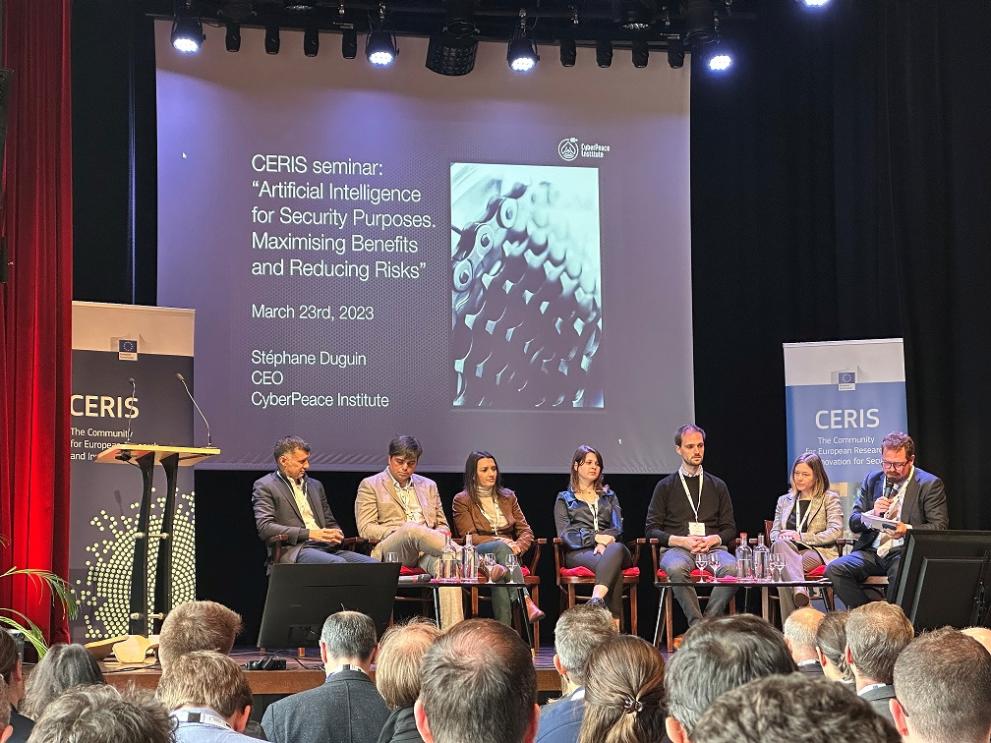
On 23 March 2023, the European Commission organised a workshop on the current and future use of Artificial Intelligence (AI) for security purposes. This workshop was carried out in the framework of the Community for European Research and Innovation for Security (CERIS), with the active involvement of the EU agencies Europol and eu-LISA. The 90 participants included security practitioners, policy makers and researchers as well as representatives from industry and civil society.
In her opening speech DG HOME Director Marta Cygan underlined that AI tools have the potential to help law enforcement authorities when investigating terrorist content online or for combatting child sexual abuse. However, if the public is to accept the use of AI by these authorities, it must have confidence that the respect of fundamental rights and freedoms is ensured. Only by ensuring public trust, law enforcement will benefit from the opportunities of AI. The need for such a balanced approach is mirrored in a recent EU-wide survey carried out by the AP4AI project, in which 87% out of 6000 people interviewed agree that the police should use AI to detect criminals and criminal organisations.
In three panels, the participants discussed the following topics:
- The proposed AI Act and its implications for law enforcement: Participants discussed the legislative state of play and the preparations for its implementation. Europol and CENTRIC presented the 12 accountability principles elaborated in the AP4AI project with the aim to ensure that AI tools are developed and deployed in a trustworthy and responsible manner. Security practitioners explained their operational needs, in particular how AI could help to screen and make sense of huge amounts of data. One tool identified to enable trust is standardization, where relevant work will begin soon in the European Committee for Standardisation (CEN) and in the European Electrotechnical Committee for Standardisation (CENELEC). Another tool underlined in the discussion is the use of regulatory sandboxes, for example via Europol.
- In the 2nd panel, the participants discussed the need and options for a future European Security Data Space for Innovation. The panel started with a presentation of an on-going Commission Study to support the technical, legal and financial conceptualisation of a European Security Data Space for Innovation. In the discussion, the participants underlined the need for a data platform, data lake or an ecosystem, which would enable improve the access of law enforcement authorities to high quality but non-operational data to test, train and validate algorithms. There was a common understanding that a rulebook is necessary which includes functional, technical and legal requirements for data sharing and use, data sovereignty, and a reliable and secure way to exchange that data. Both security practitioners and project leaders underlined the need to base their work on practical use cases (e.g. fighting child sexual abuse, smart crawlers for darknet). Many participants underlined the need for a sufficiently centralised approach, looking in particular at Europol, but also at eu-LISA.
- The 3rd panel looked into different EU security research projects, such as: The D4FLY project on border checks integrated AI into its solutions to detect false documents and facilitate a smooth border crossing. The GRACE project developed multiple intelligence tools to identify victims of child sexual abuse online, which provides actionable insights to law enforcement authorities. The S4ALLCITIES project provides solutions for the management of the security infrastructure of a modern city, such as real-time video analysis, and solutions for the management of the safety and security of public spaces.
During and after the event, many participants underlined the importance of CERIS to exchange different views on the use of AI for security purposes as well as for networking among stakeholders.
More information
The presentations are found in the event's page.
Details
- Publication date
- 29 March 2023
- Author
- Directorate-General for Migration and Home Affairs
